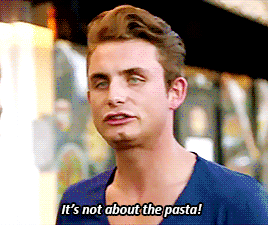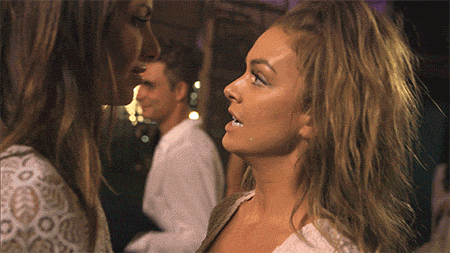Stassi Schroeder, a young, blond waitress with a penchant for statement necklaces, just wants the truth. For months, rumors have circulated amongst her coworkers/friends that her on-again, off-again boyfriend, Jax Taylor, had sex with her best friend, Kristen Doute. For almost the whole season, Kristen adamantly denies these rumors while also urging Stassi to see past Jax’s (numerous) flaws and get back with him.
It takes some convincing for Stassi’s fears to be eradicated. Years of being with the manipulative Jax have seemed to warp her into always assuming – perhaps as a coping mechanism – that the worst is probably true. Their relationship takes the biggest hit when he admits that he accidentally impregnated and paid for an abortion for a woman he hooked up with in Las Vegas. Kristen playfully chides Stassi for doubting her. After all, aren’t they best friends? She would never betray her trust like that. Stassi and the viewers’ minds are put at ease; this was just another attempt on Bravo’s part to twist suspicion into a plotline.
Well, until Kristen, drunkenly crying at a coworker’s engagement party, admits that she and Jax hooked up not only once, but twice while her boyfriend slept in the next room over, and while Stassi was struggling with the decision to get back with him or leave him forever.
It is, in my opinion, one of the most riveting twists to have ever appeared on television, one so cruel that I audibly gasped. (The Ringer recently agreed, putting this episode of Vanderpump Rules at number 23 (23!) on their “100 Best TV Episodes of the Century” list.) A private betrayal made public after months of staunch denial – what could be more satisfying? Nothing. Well, except for when Stassi reaches out and slaps Kristen across the face – snapping without warning, as quickly as a snake’s bite.
It was the most deliciously dark-sided catharsis I’d ever felt from a TV show.

Unlike Bravo’s other offerings, which largely center on wealthy and/or influential people, Vanderpump Rules focuses on the impossibly beautiful and impossibly cruel wait staff of SUR, which, of course, stands for Sexy Unique Restaurant, owned by Real Housewives of Beverly Hills star Lisa Vanderpump. “The waiters at SUR want to be actresses and models,” says Stassi proudly in a talking head interview in the series premiere. “The waiters at other restaurants just want to be waiters at SUR.”
SUR’s employees are made up like celebrities, but instead of walking red carpets, they’re slinging SUR’s famous fried goat cheese balls and what I imagine can only be the most cloyingly sweet martinis (called Pumptinis, obviously) known to mankind. I wouldn’t go so far as to call their experiences relatable, but it is certainly more accessible as a show than those of the Housewives conglomerate. It’s the same level of high drama – friends falling out over imagined slights, cheating, backstabbing – but set in low-rent apartments.
Vanderpump came into my life at a strange time, when literally every single thing annoyed me. Innocuous things, like a differing opinion (even a shared opinion), would get under my skin and fester there until it turned to seething rage. Random things people said in passing would get lodged in my brain, churning around in the folds, until it turned into a dark obsession. In return, I’d lash out randomly and stop talking to people to punish them for things they didn’t know they had done. I felt like everyone was crossing my boundaries, but found that I rarely vocalized what those boundaries were. I had morphed into the worst version of myself – someone I barely recognized, controlled by the base emotions of paranoia and jealousy.
Reality TV has a way of taking a personality and stretching it to its most extreme. A loveable drunk becomes an alcoholic. A directionless cheat becomes a full-fledged psychopath. A quiet bride-to-be becomes a raging bitch. A cool girl who just wants to be excluded from the narrative is an uppity snob. A newcomer who wants to be liked by everyone becomes a social climber/“bootleg Kardashian.” Most accounts of Vanderpump’s cast members in the wild report them as being perfectly nice. The distortion just gets turned all the way up as soon as a camera follows you around and someone else has final cut on your on-screen presence.
The cast of Vanderpump seemed to have the same issues I was having, but theirs were further fueled by the network’s ability to foot their bar tabs and lavish vacations. They were living a much more telegenic lifestyle than me – I wasn’t having my birthday party breakdowns in neon-drenched Las Vegas bars – but they were acting out my emotions. They’d let the tiniest things spiral out of their control because they felt hurt. Could they articulate that in a rational way? No, of course not. But neither could I.
When Stassi found out that her closest friend, Katie, was hanging out and getting along with Scheana – a coworker Stassi had ostracized when they first met because she was paranoid she would sleep with Jax – she completely cut Katie out of her life. Years of being with Jax seemed to translate to an across-the-board, scorched-Earth policy. No one she cared about would ever make her look like a fool again. (Except maybe herself). She moved to New York with little to no warning, leaving behind her friends in Los Angeles for a man who turned out to be emotionally abusive. She spends an entire season trying to win Katie back, a call back to when Jax was single-mindedly obsessed with convincing Stassi to get back together. Thankfully, she doesn’t get back with him. But she does eventually win Katie back. (I teared up.)
Another example: Kristen’s ex-boyfriend, Tom Sandoval, started dating his fellow bartender, Ariana, after their breakup. This new relationship coincided with Kristen’s very public emotional breakdown. The show immediately gives her the villain edit – she “accidentally” calls Tom “babe,” she insists on dressing up in her sexiest outfit to pick up mail that comes to their former shared apartment, she invites a random woman who insists that Sandoval cheated on Ariana with her in Miami to confront him at SUR. I’m not saying her behavior was right; she definitely lost the thread there, getting caught up in her own machinations, and coming off foolish at best and mentally unstable at the worst. But I couldn’t fully blame her for melting down so publicly and so quickly. Sandoval got with the woman who Kristen suspected he was cheating on her with while they were dating, almost immediately after their breakup. It was a confirmation of her worst fears; he had been emotionally gone, long before they ever said goodbye. The show wanted me to see bitch, but I just saw betrayed.
Or, take Katie, a woman who comes off quiet and level-headed, who just wanted to take her relationship with Tom Schwartz to the next level. She wanted commitment in the form of marriage, but he wasn’t emotionally mature enough to make that commitment. When he finally proposes to her, the show highlights her anxieties and frames her as a marriage-obsessed, frigid nag. We watch her mutter that her fiancé’s “dick doesn’t work.” He, in return, calls her a bitch. It was harrowing. The edit only gives us the hatred, the unresolved trust issues, the sexual frustration. Her sex life with Tom gets aired out for viewers to see. We are made aware of just exactly how little sex they’re having to the point that it’s uncomfortable. We are already voyeurs for watching the show, but we are made more explicit voyeurs when they mumble about it being weeks or months since their last time. The show tries to implicate us in their dysfunctional relationship. They do make it down the aisle, but their whole relationship still upsets me – a case of two people unable to articulate their anger and fear healthily.
Seeing these women break down and lash out didn’t invoke the “guilty pleasure” feeling in me, though it is a more than fair way to feel watching the show. I just saw hurt people hurting people. I identified with and felt for these “characters” in the same way I felt for the perfectionist Nina in Black Swan, volatile teen Christine in Lady Bird, or emotionally-depleted Susan in Nocturnal Animals. They aren’t aspirational, but these film characters had come into my life at the exact moment they were necessary to show their emotional failings on-screen, and to illuminate my own. In my opinion, this is the greatest magic trick film can do – allow us to see ourselves in lines of dialogue or in a flicker of emotion in an actress’s eye. And it was a trick that Vanderpump, knowingly or not, was pulling as well.
My intention in watching wasn’t to compare my life to Bravo’s version of the cast’s lives. And at the beginning, I had no idea that the show would be an impetus to investigate my emotions, boundaries, and behaviors. I found myself watching because their behavior, in overdrive due to alcohol and Emmy-worthy editing, was just an exaggeration of the things I was doing. And I wanted to know how they got out of their scrapes. The answer: they don’t always. They fall into the same patterns. And there on reality TV, one of the fakest places on TV, I found something real.

The most well-known moment from the show is, out of context, completely ridiculous. James, a wiry, British SUR busboy-turned-SUR DJ, is fighting with his crush-turned-best-friend, Lala. She remarks that she ate the pasta his girlfriend Raquel had ordered while James was DJing a set at SUR one night. It was a ha-ha, whoops moment, meant to highlight how Lala is trying to become friends with Raquel. James, however, did not think it was funny. In fact, it was indicative of Lala’s disrespect for his girlfriend! How dare she! It turned into a blow-out fight. Lala didn’t understand why James was so upset over her finishing Raquel’s dinner; James couldn’t understand how Lala could be so disrespectful to his new girlfriend. Their fight culminates in the sound bite heard around the world. In the most sniveling, stereotypically-English voice he can muster, James shouts, “IT’S NOT ABOUT THE PASTA!”
The rumor is that “pasta” is a code word on the show for cocaine. Part of me absolutely believes that he’s talking about coke, because it’s fun to believe that the cast of Vanderpump is communicating with you via code. Pasta being code for cocaine is the equivalent of playing Beatles records backwards to hear “I buried Paul.” Even if he’s talking about coke, it’s not about the coke. Or the pasta. Or whatever.
The tiniest things get overblown and become metaphors for other things. It’s never actually about the thing. It’s what the thing represents. Reality TV is so good at making metaphors from the most innocuous things. James was already drunk when he shouted that iconic and ridiculous line, but I felt what he meant in my heart. I wish he was able to spit it out and tell Lala what he really meant, because now the funny line has overtaken the sentiment. You can buy anything with the phrase slathered on it, from t-shirts to cross-stitchings to wine glasses. He mentions it regularly on his Instagram stories and shouts it during his DJ sets at SUR. On Vanderpump, you can capitalize on all your messy feelings until you don’t even remember what you were fighting about in the first place.

Vanderpump didn’t entirely reform me. I still have the tendency to obsess over others’ comments or actions, or find myself seeking confirmation of my more suspicious and paranoid thoughts. Like James, I tend to make pasta about something more than pasta. But watching Vanderpump helped me recognize when this behavior crosses over into irrationality, when I’m no longer protecting myself, but rather hurting myself and others. The cast’s irrationality makes me reflect on my own. We see Kristen, unmedicated and broken, plotting, thinking that she will finally get the proof she needs to be exonerated of her sins. We see Stassi walking out on her friends again, thinking she has the upper hand. We see Katie burying every doubt deep down and hoping no one asks about it. And then, a few episodes later, we see the fallout. The train wreck we were watching in slow motion finally wrecks. I shout at them (and myself) for not seeing the rational way out of these situations. And yet, the train still crashes.
The show is currently filming, and unlike other TV shows and movie plots, you can easily access its “plotlines” before the show even airs if you’re willing to follow its cast on social media. (I had to unfollow most of them, except for Katie, who will always my favorite because of our shared Capricorn sun sign.) If you scroll through the cast’s Instagram Stories, it would seem that they have all reached a kind of sweet contentedness with one another. Tom Sandoval and Tom Schwartz have finally opened Tom Tom, their long-awaited bar with their boss-turned-business-partner Lisa Vanderpump. They drape their arms over Jax, all smiling for the camera – Jax’s threats to expose the Toms’ secrets all but forgotten. The girls pose for vacation pics while relaxing (from what exactly?) in Mexico. For the first time in years, they seem to have settled into a rhythm with one another, accusations of cheating and personality defects a thing of the past.
But I know better. Shaping your personality into something much more sustainable and healthy is an uphill battle. I know it because I’ve been trying with varying levels of success for months, trying to find my own “redemption arc.” But I run up the hill only to fall into the same traps of anger and paranoia. There’s comfort in knowing that if I’m struggling with it, the cast probably is as well. And they’re more likely to fight with one another than fight for their mental stability. Like the “It’s not about the pasta” merchandise, it tends to sell better than total forgiveness.
And yet, I can’t wait to watch that train crash again next season.

